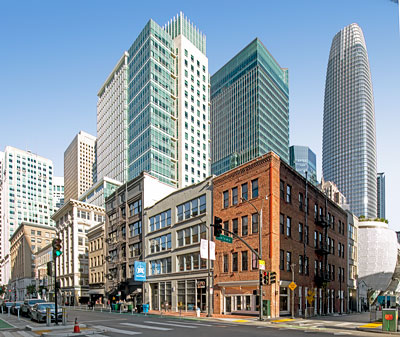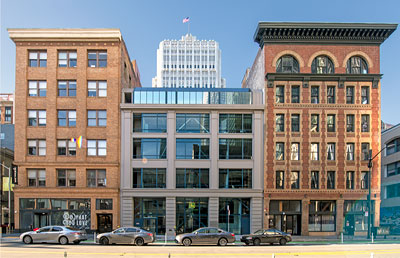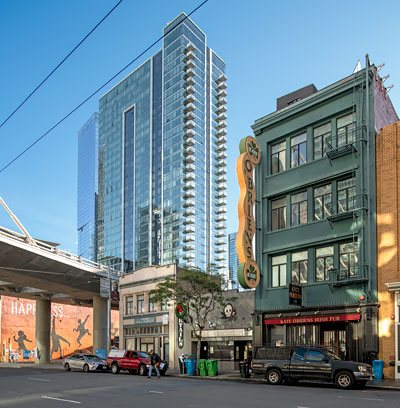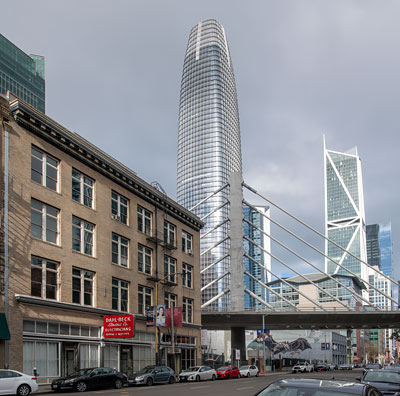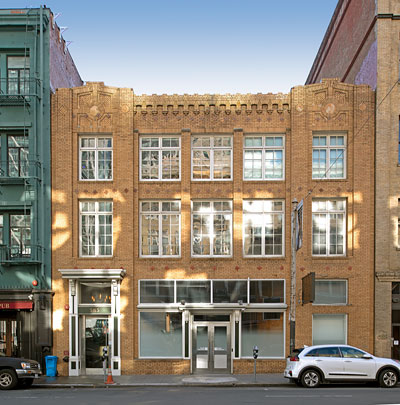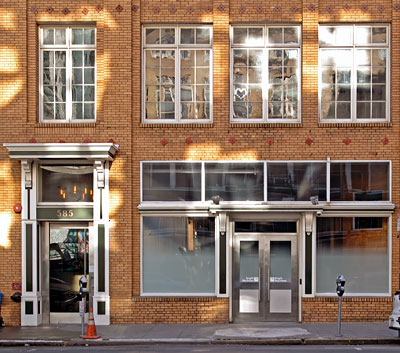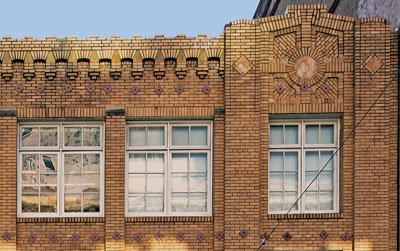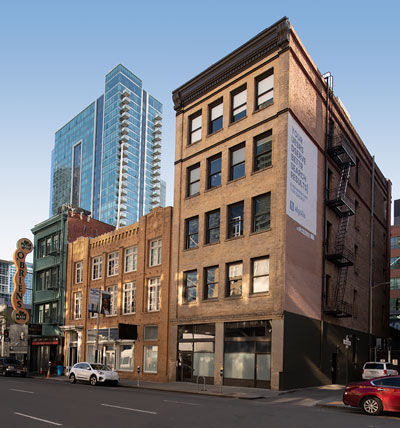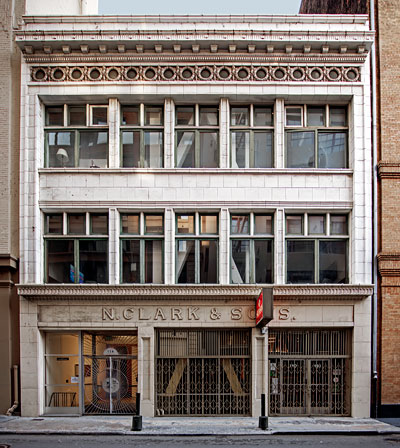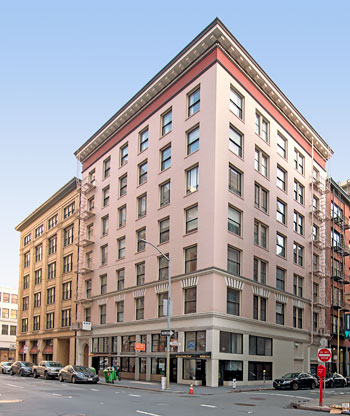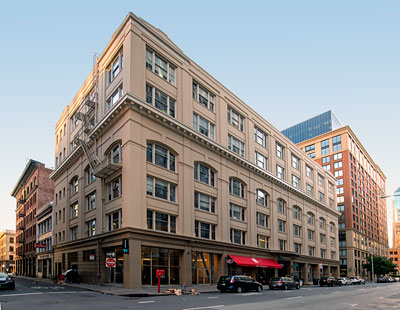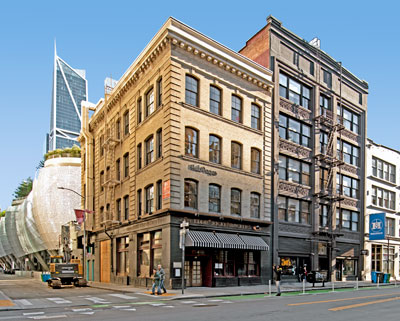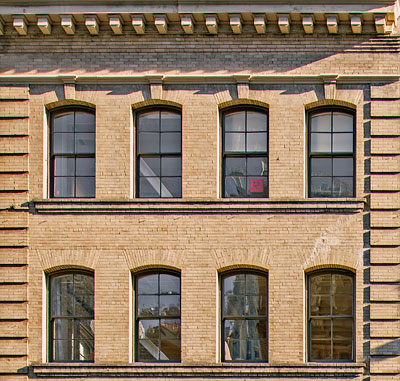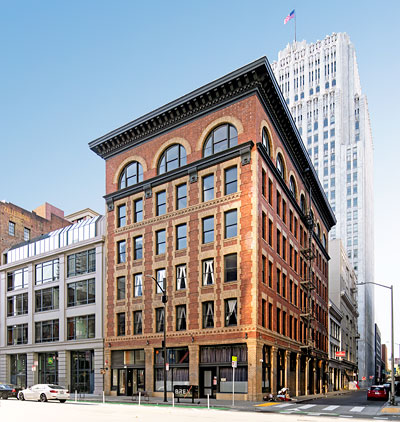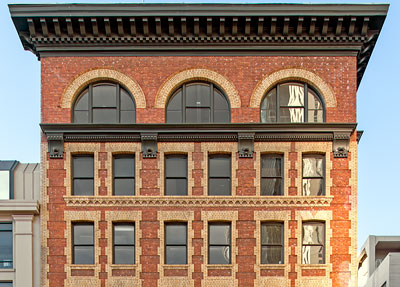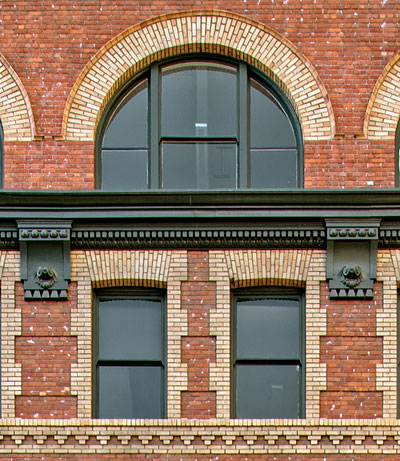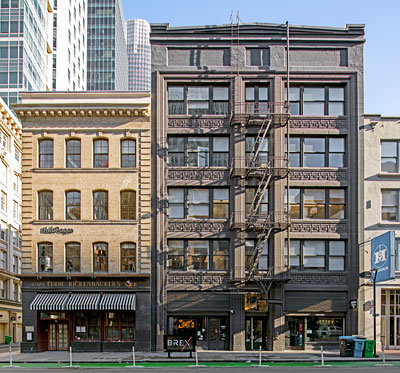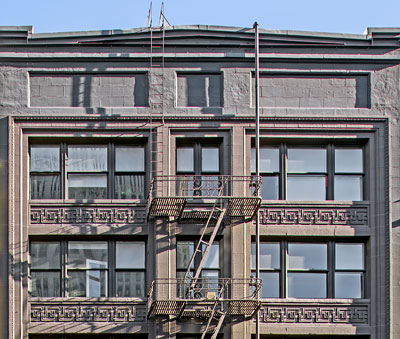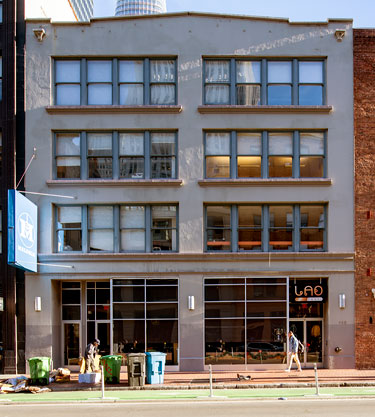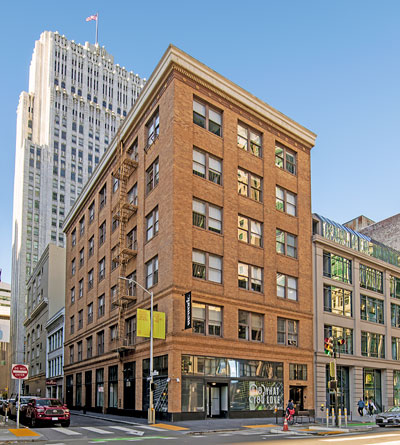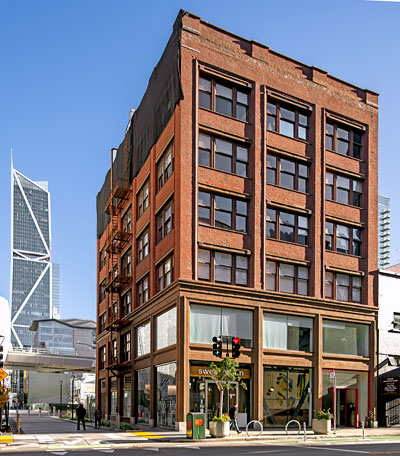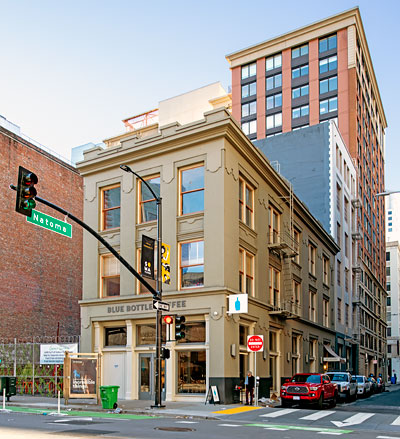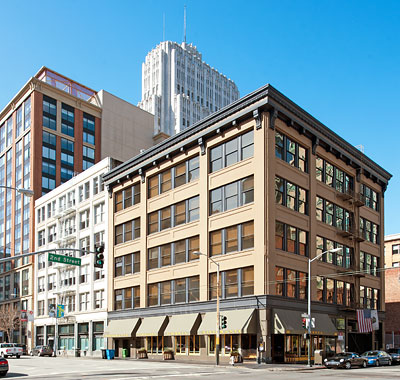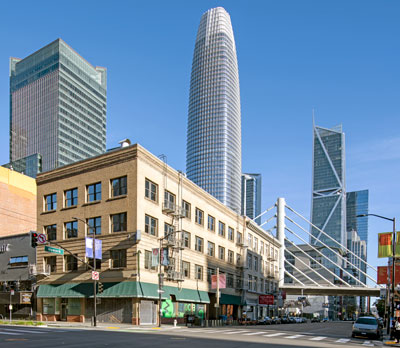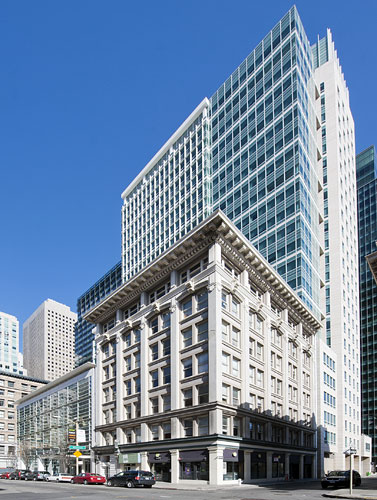National Register of Historic Places in San Francisco
Second and Howard Street District
121-198 2nd Street
579-612 Howard Street
116 Natoma
111-163 New Montgomery
Built Various Years
Before the 1906 Earthquake and Fire, the area that was to become the Second and Howard Street District contained mostly smaller buildings, about a third of them frame. There were quite a few dwellings and lodging houses, a glove factory, a patent medicine factory, a book bindery, plumbers, some restaurants, more saloons, and a large number of stores not specifically identified on the Sanborn map of 1905.
The earthquake and subsequent three day fire totally destroyed the District. If any walls were left standing, they were later demolished for the construction of the buildings that form the District.

The Second and Howard Street District is comprised of 310 acres containing nineteen contributing buildings.

We are using the names the buildings had in 1910 or the names of a primary tenant in that year.
| Name | Year | Address | Remarks | Sort Address | Sort Name |
|---|---|---|---|---|---|
| Rapp Building | 1907 | 121-131 Second Street | Reid Brothers, architects | !Street 02 121 | Rapp Building |
| Excelsior Glove Factory | 1907 | 132-140 Second Street | John Cotter Pelton, architect | !Street 02 132 | Excelsior Glove Factory |
| Frederick Post Company | 1906 | 133-137 Second Street | William Curlett, architect | !Street 02 133 | Frederick Post Company |
| Rincon Building | 1907 | 141-145 Second Street | John Cotter Pelton, architect | !Street 02 141 | Rincon Building |
| Pacific Glove Works | 1908 | 149-155 Second Street | John A. Ettler, architect | !Street 02 149 | Pacific Glove Works |
| Dean Electric Company | 1909 | 156-160 Second Street | Architect unknown | !Street 02 156 | Dean Electric Company |
| Marcus Modry Building | 1907 | 163 Second Street | Henry C. Farley, contractor | !Street 02 163 | Marcus Modry Building |
| Electric Building | 1906 | 165-173 Second Street | John Cotter Pelton, architect | !Street 02 165 | Electric Building |
| Empire Glove Company | 1907 | 168 Second Street | Hermann Barth, architect | !Street 02 168 | Empire Glove Company |
| Building at 182-198 Second Street | 1909 | 182-198 Second Street and 600 Howard Street | Architect unknown. See photo at top of page. | !Street 02 182 | Building at 182-198 Second Street |
| American Chicle Company | 1907 | 191-197 Second Street and 590-598 Howard Street | Ross & Burgren, architects | !Street 02 191 | American Chicle Company |
| United Sheet Metal Works | 1910 | 579 Howard Street | Ross & Burgren, architects | Howard 579 | United Sheet Metal Works |
| R. W. Kinney Building | 1906 | 580 Howard Street | A. W. Smith, architect | Howard 580 | R. W. Kinney Building |
| Peters Cartridge Co. | 1912 | 583-587 Howard Street | W. J. Miller, architect | Howard 582 | Peters Cartridge Co. |
| Building at 589-591 Howard Street | 1906 | 589-591 Howard Street | Frank S. Van Ttees, architect | Howard 589 | Building at 589-591 Howard Street |
| Merritt Building | 1907 | 606-612 Howard Street | Reid Brothers, architects | Howard 606 | Merritt Building |
| N. Clark & Sons Building | 1909 | 116 Natoma Street | Cunningham & Politeo | Natoma 116 | N. Clark & Sons Building |
| Standard Building | 1907 | 111-121 New Montgomery Street | Reid Brothers, architects | New Montgomery 111 | Standard Building |
| Greenwood Block | 1907 | 137-163 New Montgomery Street | Henry A. Schulz, architect | New Montgomery 137 | Greenwood Block |
579 Howard Street
Built 1906
Photographed 15 December 2019
Ross & Burgren designed this four-story, stucco clad brick building. the historic integrity is good except for T-bar window sash, modern store fronts and wiggly blade sign.
When we photographed the building, it housed Kate O'Briens Irish Pub.
580 Howard Street through to Minna Street
Built 1906
Photographed 12 January 2020
Architect A. W. Smith designed this four-story, brick-clad building. Design features include light tan brick, heavy galvanized iron cornice with modillion blocks and historic blade sign. A deeply recessed floor was added in 1998.
1910 Tenants were R. W. Kinney Co. (plumbing supplies) and Western Press.
The tallest tower in the photograph is the Salesforce Tower with sixty-one floors and a height of 1,070 feet. The second tallest tower is 181 Fremont with fifty-six floors and a height of 821 feet to the tip of the spire. The suspension bridge connects the Salesforce Transit Center to the Bay Bridge and is dedicated to buses.
583-587 Howard StreetPeters Cartridge Co.
Built 1912
Photographed 15 December 2019
1910 Tenants were
Built 1906
Photographed 15 December 2019
1910 Tenants were
116 Natoma Street through to Minna Street
Built 1909
Photographed 15 December 2019
Cunningham & Politeo designed this three-story building which is clad in painted terra cotta. Design features include matching street elevations on Natoma and Minna and a tight row of circular garlands on fascia.
N. Clark & Son owned a factory in the city of Alameda which manufactured architectural terra cotta, pressed brick, Spanish roof tile, sewer pipe, drain tile and chimney pipe.
111-121 New Montgomery Street
Built 1907
Photographed 15 December 2019
133-137 Second Street
Built 1906
Photographed 15 December 2019
William Curlett designed this four-story building which is clad in light tan brick. Frederick Post Company, a purveyor of blue prints and drawing supplies, was located here in 1910.
132-140 Second Street
Built 1907
Photographed 15 December 2019
John Cotter Pelton designed this six-story building which is clad dark red brick contrasted with tan brick trim. Design features include roundheaded triple windows on the sixth floor and a large modillioned and dentilled cornice.
Tenants in 1910 were Excelsior Glove Factory, Farnsworth Electrical Works and Hoffschneider Brothers (electrotypers).
141-145 Second Street
Built 1907
The Rincon Building was designed by John Cotter Pelton. The five-story building is clad in terra cotta ornamented with an egg-and-dart enframement and a variation on Greek key design for the spandrels.
In1910, the building was owned by Barker, Knickerbocker and Bostwick. Tenants included American Electric Fuse Company; B.C. Broadwater (mining engineer); Cutler Water Heater Company; Hunt, Mirk and Company (engineers and dealers in machinery); Eugene C. Knowles (metallurgist); Charles W. Merrill (mining engineer); Louis D. Mills (metallurgist); Paris Modes Company (paper patterns for dresses); A.B. Scott (metallurgist); Samuel Watson (printer); and the Westinghouse Machine Company.
149-155 Second Street
Built 1908
Photographed 15 December 2019
John A. Ettler designed this stucco-clad, four-story building.
The building had a cornice, but it was removed. Many San Francisco buildings had cornices removed in the last quarter of the 20th century as an earthquake safety measure. This may have been one of them.
Tenants in 1910 were Pacific Glove Works, San Francisco Saddlery Company, and A.J. and J.R. Cook (leather dealers).
156-160 Second Street
Built 1909
Photographed 15 December 2019
The architect of this six-story, brick-clad building is unknown. Design features include variegated orange to tan brick, bays recessed between piers, and paired double hung windows. The cornice was possibly modified at some point.
1910 tenants included Dean Electric Company, Bailey Specialty Company (manufacturing stationers), H. K. Mulford Company (chemists), National Conduit and Cable Company, and United Workingmen's Boot and Shoe Manufacturing Company.
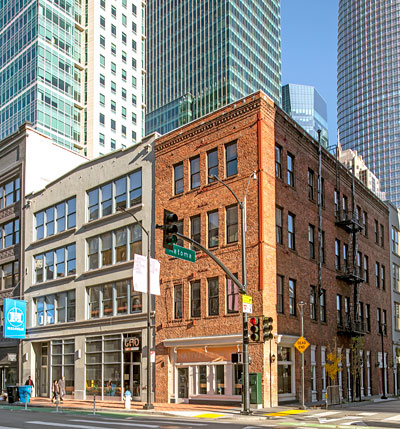 149-155 Second Street and the Marcus Modry Building
149-155 Second Street and the Marcus Modry Building
163 Second Street
Built 1907
Photographed 15 December 2019
Contractor Henry C. Farley built this unadorned, brick-clad building. The original use of the building is unknown.
165-173 Second Street
Built 1906
Photographed 15 December 2019
Architect John Cotter Pelton designed this six-story, brick-clad buildin. Design features include modified Chicago windows on the third through sixth floors, fluting on piers, and moldings to box in first and second floors.
The building had a cornice, but it was removed. Many San Francisco buildings had cornices removed in the last quarter of the 20th century as an earthquake safety measure. This may have been one of them.
In 1910, the Westinghouse Electric and Manufacturing Company was here.
168 Second Street
Built 1907
Photographed 15 December 2019
Architect Herman Barth designed this three-story, stucco-clad building. Design features include a box cornice, a fascia dipping down below the tops of double-hung windows.
Tenants in 1910 included the Empire Glove Company and The Glafke Company (oil burners and valves).
Built 1907
Photographed 15 December 2019
The building on the northwest corner of Second and Howard was built in 1909. The architect is unknown and the original tenants are unknown,
The adjacent six-story white building (606-612 Howard Street) is the Merritt Building, designed by the Reid Brothers and built in 1907.
The 26-story Art Deco skyscraper in the background is the AT&T building (140 New Montgomery Street) built in 1924. The AT&T Building is not located within the District.
Built 1907
Photographed 15 December 2019
This four-story building, clad in light tan brick, was designed by Ross & Burgren. Design features include rustication at the second floor, corbeled cornice, two corbeled string courses and paired double-hung windows which are deeply recessed.
Tenants have included American Chicle Company, Badische Company (chemicals) and Jesse Moore-Hunt Company (liquor wholesaler).
121-131 Second Street
The Rapp Building, designed by the Reid Brothers, was built just after the 1906 Earthquake and Fire.
The 26-story building behind the Rapp Building is 55 Second Street, an office building completed in 2000. The entrance to 55 Second Street is a four story atrium to the left of the Rapp Building in the photograph.
